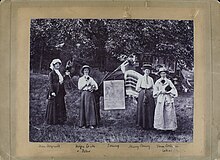| Helga Gill | |
|---|---|
 Helga Gill pictured with Mary Bury, Vera Collison, and Miss Meynell on the first First Suffrage Caravan Tour through Leciester and Northamptonshire Helga Gill pictured with Mary Bury, Vera Collison, and Miss Meynell on the first First Suffrage Caravan Tour through Leciester and Northamptonshire | |
| Born | 1885 Bergen, Norway |
| Died | 1928(1928-00-00) (aged 42–43) |
| Nationality | Norwegian |
| Occupation | NUWSS Organiser |
Helga Gill (1885–1928) was a Norwegian-British suffragette. She was an organiser for the National Union of Women's Suffrage Societies and campaigned on behalf of Women's Suffrage across the UK.
Early life
Helga Gill was born in 1885 in Bergen, Norway to parents were Johan Klerk Gill and Karen Marie Ottilia Gill. She was their oldest child and had five siblings. Her mother died when she was a child, and Helga helped raise her brothers and sisters.
Work at NUWSS
Helga Gill initially visited the United Kingdom for a holiday. She made friends with members of the politically prominent Corbett family, Marie and her daughters Cecily and Margery. Gill was speaking at suffrage meetings and was the organiser of the NUWSS by 1909. Sissel Rosland has argued that she was a 'popular and busy campaigner' between 1909 and 1914. Newspaper reports show that she was critical of the militancy of the suffragettes, and frequently referenced her Norwegian origins in her speeches. Norway had given women partial suffrage in 1907, and so Gill's viewpoint of a voting woman was valued. By 1912 she was an Organiser for Oxford, Berks, and Bucks and was sent on a tour of Ireland by the NUWSS to promote women's suffrage.
Work in World War I
When World War One broke out in 1914, Gill signed up to join the Scottish Women's Hospitals, a wartime project funded by the NUWSS. She was a part of the French Hospital Unit and left for France in December 1914, where she was based at Royaumont Abbey. Gill worked as an ambulance driver, transporting injured soldiers to the hospital. This was a dangerous role that carried the risk of being killed. This work took its toll on her health, and because of this she left France and worked at HM Factory Gretna for the remainder of the war.
Personal life
Helga adopted a war orphan, John Gill. She was the only woman member of the British Legion, Danehill branch and also ran the Boy's Brigade and was a member of the Women's Institute.
Later life and death
Helga Gill's health was permanently affected by her wartime service. She died suddenly as a result of a car crash on 16 November 1928, and was mourned both by the local community, in The Mid Sussex Times, and by suffrage periodical The Common Cause.
Awards
As a result of her wartime work in France, she was awarded the British War Medal, British Victory Medal, Croix de Guerre, and the Medaille des Epidemies.
References
- ^ "Helga Gill · Mapping Women's Suffrage". map.mappingwomenssuffrage.org.uk. Retrieved 22 September 2021.
- ^ Hewitt, Judith (29 September 2021). "Worker of the Week: Helga Gill". Devils Porridge Museum. Retrieved 17 November 2021.
- ^ "Obituary: Miss Helga Gill". The Common Cause. 30 November 1928. p. 7.
- ^ Rosland, Sissel (18 October 2017). "Norway as an Example in the UK Women's Suffrage Campaign". Nordic Journal of Feminist and Gender Research. 25 (3): 195–210. doi:10.1080/08038740.2017.1378258. S2CID 158415039 – via Taylor and Francis.
- "Mid Bucks Women's Suffrage Society". Bucks Herald. 25 December 1909. p. 6.
- "Votes for Women". Luton Times and Advertiser. 12 November 1909. p. 3.
- "Norway gives women partial suffrage". OUPblog. 14 June 2012. Retrieved 17 November 2021.
- "Miss Gill's Tragic Death". The Mid Sussex Times. 27 November 1928. p. 9.
External links
- https://map.mappingwomenssuffrage.org.uk/items/show/265
- https://www.devilsporridge.org.uk/worker-of-the-week-helga-gill